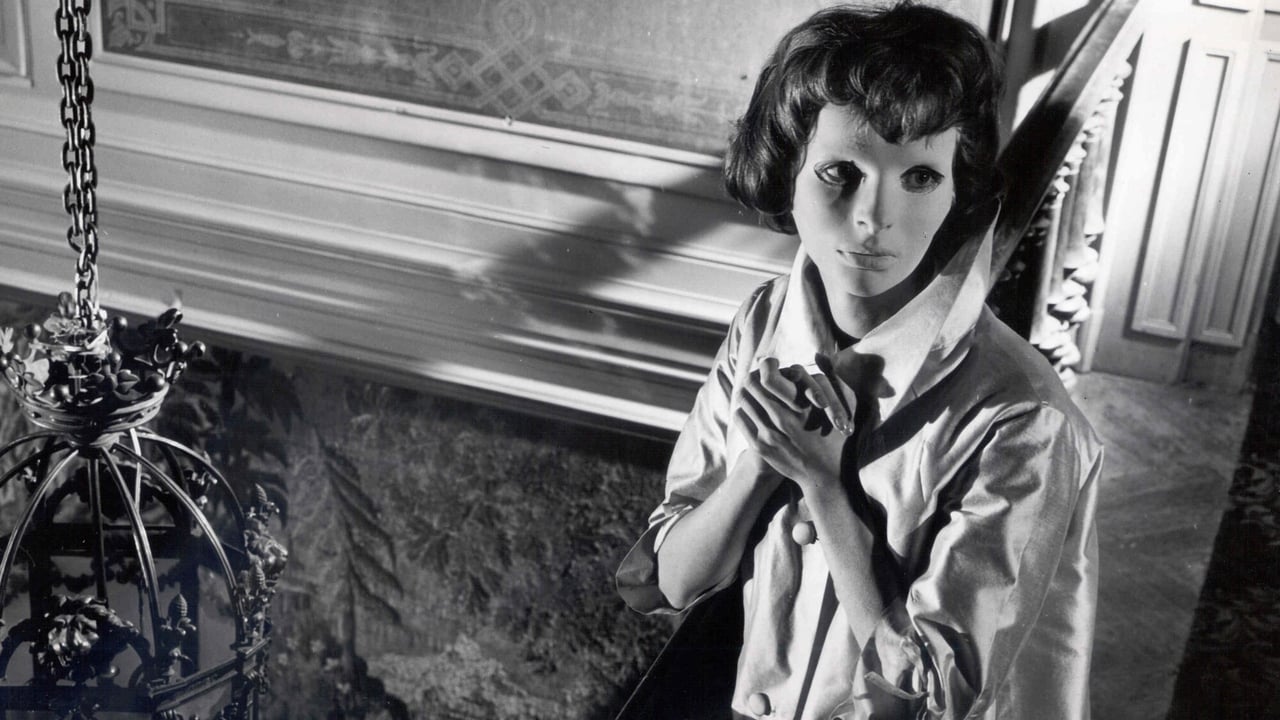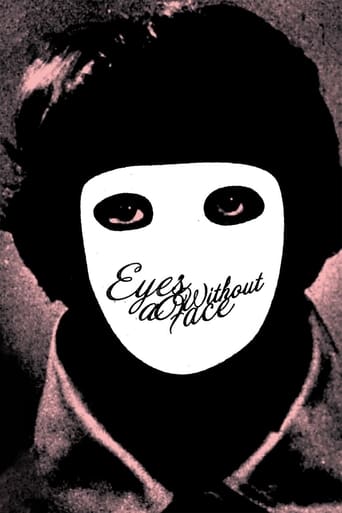



I was totally surprised at how great this film.You could feel your paranoia rise as the film went on and as you gradually learned the details of the real situation.
View MoreInstead, you get a movie that's enjoyable enough, but leaves you feeling like it could have been much, much more.
View MoreIt's the kind of movie you'll want to see a second time with someone who hasn't seen it yet, to remember what it was like to watch it for the first time.
View MoreThis is ultimately a movie about the very bad things that can happen when we don't address our unease, when we just try to brush it off, whether that's to fit in or to preserve our self-image.
View MoreThis is an artsy horror film from France made in 1960. A surgeon and his apprentice abduct women off the streets and then perform a facial surgery to graft their skin on a woman they have kept imprisoned. Saying anything more would be doing disservice to the film but here is what I can say: This is a haunting film full of intense atmosphere right from the location and setting to the method by which most actors enact their characters. The music also adds to the surreal nature and if such films with surrealistic images and intense atmosphere (which take preceding over plot or character) than this should be a must watch on your list.
View MoreThis film is very well done, it's definitely an older movie which shows in the pacing and the very basic cinematography. I watched this film all the way through and what I found was that the story was great! Very basically told but entertaining to watch, I don't know that I would call it a horror film, its more of a thriller with the elements in it. It's a very fine line to draw between thrillers and horror films. The actress behind Christiane was wonderful at portraying her character's emotions from behind the mask, I only wish that we spent more time with her and learned more about her as a character as she was probably the most entertaining part of the film. I found myself getting annoyed by the soundtrack that was used repeatedly throughout the film when someone was being stalked. The transitions between scenes grew rather tiresome but its expected of an older film. Overall, the film may have dragged a little at parts, the soundtrack can be annoying, but the story and characters make it entertaining to where its hardly noticeable, excellent film, definitely recommend.
View MoreEyes Without A Face stars Pierre Brasseur as renowned French surgeon Docteur Génessier, who tries in vain to restore his daughter Christiane's beauty after a car-crash leaves her horribly disfigured. With the help of his devoted assistant Louise (Alida Valli), the doctor abducts young women, grafting their faces onto Christiane, with little success.Highly regarded by many horror connoisseurs, director Georges Franju's macabre mad-scientist classic benefits from a truly cruel villain in Docteur Génessier, who not only mutilates innocent girls, but isn't above tormenting one victim's father (by denying him the right to his daughter's body at the morgue), and treating Christiane like a guinea pig in his experiments. Eyes Without A Face also features some impressive early gore (albeit in black and white), with the surgical removal of a girl's face shown in unflinching detail, and grisly deaths for Louise and Docteur Génessier, who ultimately receive poetic justice.For me, though, the film is just a little too lethargic to be a wholly satisfying experience, the 'haunting' scenes with Christiane in her smooth rubber mask a tad repetitive and a little too much time spent where nothing much of interest occurs. Overall, it's a reasonably entertaining piece, but not as great as its reputation would have one believe.
View MoreA surgical genius (also a physician of a successful hospital) and his assistant secretly abduct, drug, and take the faces of certain girls who have specific characteristics similar to a girl considered vanished by the police after a horrific car wreck that mangled her face. This girl is the surgeon's daughter, and he was the reason the wreck happened in the first place. Feeling a strong guilt for "ruining" his daughter's face, it drives him to use his own "grafting techniques" in the hopes of giving her a new face, at the cost of other girls who look like her. When a victim's body turns up in the Sienne (dumped there by the assistant), the surgeon claims it is his daughter, providing him room to continue his work unabated. When one kidnapped girl's face is removed (a Swedish girl visiting Paris in the hopes of making something of herself), there's hope that this will be the success that has eluded the surgeon; when the victim jumps out of a window as it appeared she would never escape without further harm, once again the police are confronted with the idea of a serial killer. A third woman, similar to the two other victims, caught shoplifting, is essentially blackmailed by the police to help them catch the killer; the detail of a pearl necklace by a witness (friend of the window-leaping Swedish girl) initiates an eye on the assistant of the surgeon (who wears the necklace to hide her neck scar; she herself was a facially-scarred patient that had successful repairs by the surgeon, explaining her devotion to him).The white mask and glassy eyes, and how Christiane (Edith Scob) has movements of a spectre, very mannequin like in appearance, nearly a lost soul due to all she has endured (pops responsible for taking the faces of girls unapologetically; the flesh not taking to her face and staying healthy without deterioration; having to hole up in the home, not allowed to leave), her character and look is very iconic, very distinctive and memorable. The final act (with irony in regards to her father's face, and how the release of dogs and pigeons mirrors her own newfound freedom), where it is Christiane who stops the killers, her father (Pierre Brasseur) and his assistant, Louise (Alida Valli; Senso), not the police, is fitting. Edna's chapter is just heart-breaking. The image series where the flesh of the "replacement face" taken from Edna for Christiane itself is unsuccessful further emphasizes just why the poor girl is driven into madness. She is in her own personal hell that gradually affects her mental wellbeing, causing a decline that erupts at the end. A surgery of Edna is shown in some grisly detail; matter-of-fact and coldly detached from how horrible it is, the surgeon commits totally to the process. The opening drive by Louise with a dead body in her car's back seat, intently focused on finding just the right "dumping ground" is quite an unsettling beginning due to how business-as-usual it feels as if a routine that Louise has done before. Score is at times whimsical almost as preparing us for a Buster Keaton silent comedy, quite unexpected when compared to what scene it is applied to is actually developing before us. Valli's devotion to Brasseur is one of the disturbing details that proves that a repaired face could be perhaps a fair trade for helping to dispose of bodies. The surgeon's stone-faced, clinical behavior and ability to cut himself off from his misdeeds shows that no matter what crimes he commits, his grafting expertise for his daughter takes precedence over a few lives taken.
View More